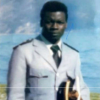Truth and justice for Wele Ousmane Abdallah, disappeared during Mauritania’s Passif Humanitaire
Timeline
April 17, 2024: MENA Rights Group request the intervention of the United Nations Working Group on Enforced Disappearances.
2000 : The African Commission on Human and Peoples' Rights condemns Mauritania due to violations committed during the Passif humanitaire.
June 14, 1993 : Law No. 93-23 relating to amnesty comes into force.
Early 1991 : Wele Ousmane Abdallah’s wife is informed that her husband died during a mission.
December 5, 1990 : Wele Ousmane Abdallah dies as a result of acts of torture suffered during his detention.
November 27, 1990: Wele Ousmane Abdallah’s wife goes in vain to the marine base to ask for explanations as to the fate of her husband accompanied by other wives of arrested soldiers.
November 27, 1990 : Wele Ousmane Abdallah is arrested within Nouadhibou marine base before being transferred to Inal.



